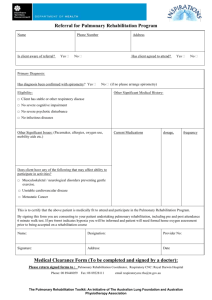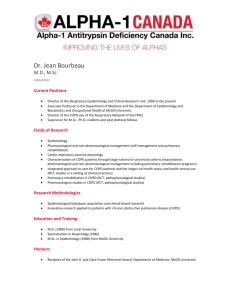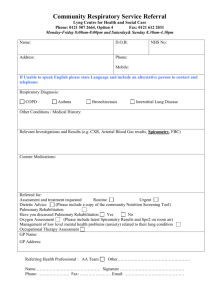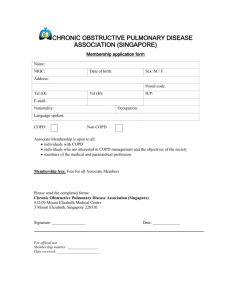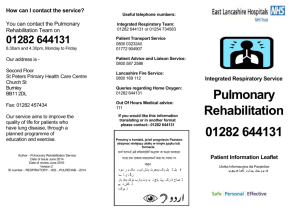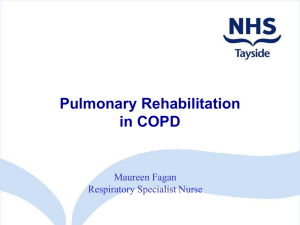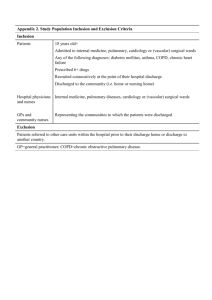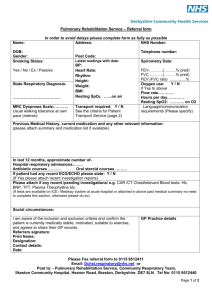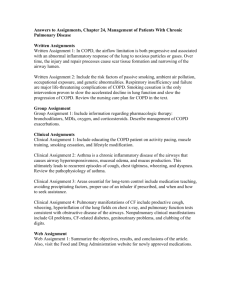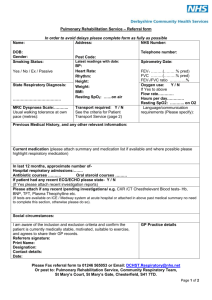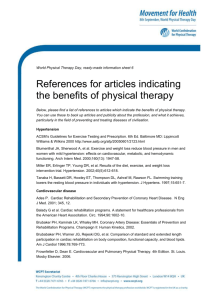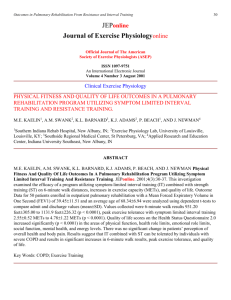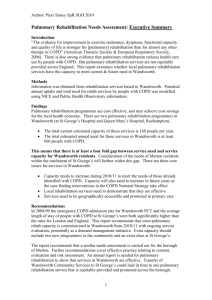Pulmonary Rehabilitation flyer - Cambridgeshire and Peterborough
advertisement
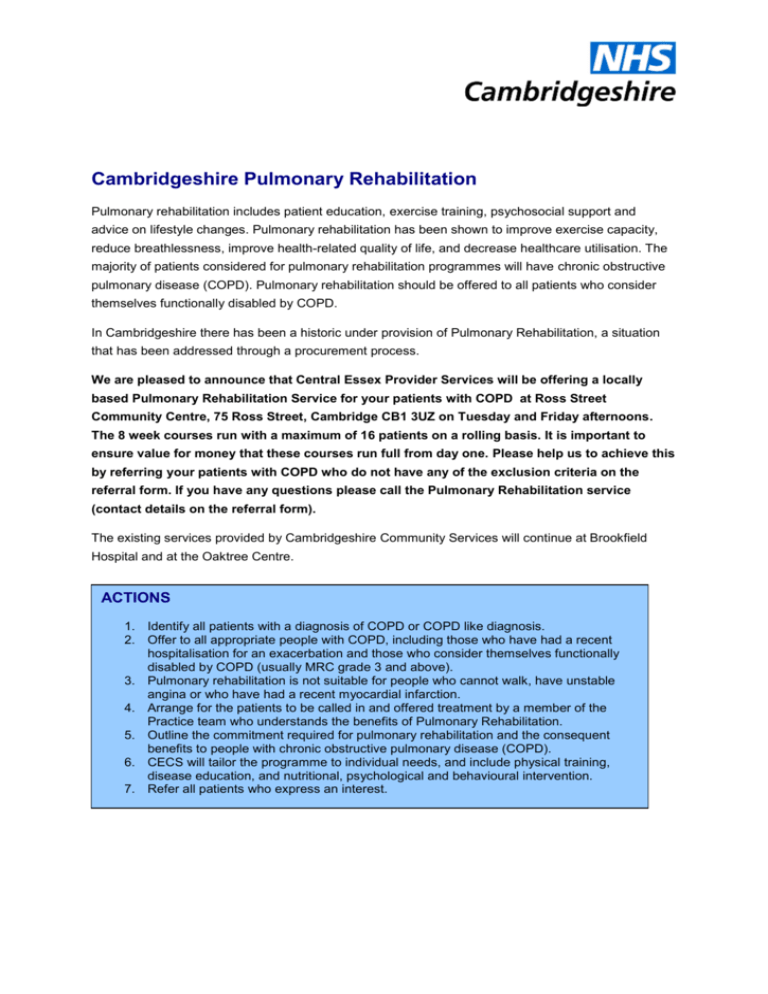
Cambridgeshire Pulmonary Rehabilitation Pulmonary rehabilitation includes patient education, exercise training, psychosocial support and advice on lifestyle changes. Pulmonary rehabilitation has been shown to improve exercise capacity, reduce breathlessness, improve health-related quality of life, and decrease healthcare utilisation. The majority of patients considered for pulmonary rehabilitation programmes will have chronic obstructive pulmonary disease (COPD). Pulmonary rehabilitation should be offered to all patients who consider themselves functionally disabled by COPD. In Cambridgeshire there has been a historic under provision of Pulmonary Rehabilitation, a situation that has been addressed through a procurement process. We are pleased to announce that Central Essex Provider Services will be offering a locally based Pulmonary Rehabilitation Service for your patients with COPD at Ross Street Community Centre, 75 Ross Street, Cambridge CB1 3UZ on Tuesday and Friday afternoons. The 8 week courses run with a maximum of 16 patients on a rolling basis. It is important to ensure value for money that these courses run full from day one. Please help us to achieve this by referring your patients with COPD who do not have any of the exclusion criteria on the referral form. If you have any questions please call the Pulmonary Rehabilitation service (contact details on the referral form). The existing services provided by Cambridgeshire Community Services will continue at Brookfield Hospital and at the Oaktree Centre. ACTIONS 1. Identify all patients with a diagnosis of COPD or COPD like diagnosis. 2. Offer to all appropriate people with COPD, including those who have had a recent hospitalisation for an exacerbation and those who consider themselves functionally disabled by COPD (usually MRC grade 3 and above). 3. Pulmonary rehabilitation is not suitable for people who cannot walk, have unstable angina or who have had a recent myocardial infarction. 4. Arrange for the patients to be called in and offered treatment by a member of the Practice team who understands the benefits of Pulmonary Rehabilitation. 5. Outline the commitment required for pulmonary rehabilitation and the consequent benefits to people with chronic obstructive pulmonary disease (COPD). 6. CECS will tailor the programme to individual needs, and include physical training, disease education, and nutritional, psychological and behavioural intervention. 7. Refer all patients who express an interest. What Are the Benefits of Pulmonary Rehabilitation (PR) The rehabilitation process incorporates a programme of physical training, disease education, nutritional assessment and advice, and psychological, social, and behavioural intervention. Respiratory rehabilitation is effective in helping to relieve dyspnoea and improve control of COPD. PR for patients with COPD has also been shown to relieve fatigue, improve emotional function and enhance patients' sense of control over their condition Patients who have undertaken PR are less likely to be admitted to hospital for all causes than non–rehabilitated contemporary. Setting Research by the Cambridgeshire Community Services demonstrated that even within Cambridge City itself patients are un-willing to travel for PR. Our specification addressed this by specifying that PR should be offered locally to patients across the entire county. CECS sessions will be held in local venues that are fully assessed as safe and suitable for PR. Once the service is running across the county patients will be able to choose which centre they wish to attend. Programme content Programme offers patients a two hour session twice a week for 8 weeks and includes physical exercise, disease education, and psychological and social intervention. Each session includes 60 minutes of exercise. The patients are then offered refreshments followed by the education component that lasts for an hour. Physical aerobic training, particularly of the lower extremities (e.g. brisk walking), is core to the programme. Exercises do not involve technical equipment so that patients can continue with the same exercises at home. Patients are offered two supervised sessions a week and are encouraged to exercise once a week at home without supervision. Upper limb and strength-building exercise is also included. Exercise prescription should be individually assessed. Individual training intensity is recorded and increased through the programme if appropriate and tolerated. Training frequency should involve three sessions (20-30 minutes) per week, of which at least two will be supervised. Supplementary oxygen during training should be provided if necessary. Please consult the Specialist Nursing – Respiratory team. If your patient is on oxygen it is essential that you provide their latest blood gases results when you refer them so that their oxygen can be administered safely during their sessions. Comprehensive disease education for patient and family is an important part of overall management and can be included within the rehabilitation programme. Individual advice on physiotherapy, nutrition, occupational therapy, smoking cessation, end of life planning, and physical relationships are also be included. Referral Process • Referrals can be made by any Health Care Professional. • The patient should be involved in the decision to undertake Pulmonary Rehabilitation. • The referral form attached should be sent to the fax number at the top of the form. • The patient will then be called for an assessment after which they will be added to next available course, subject to the patients’ suitability and agreement.
